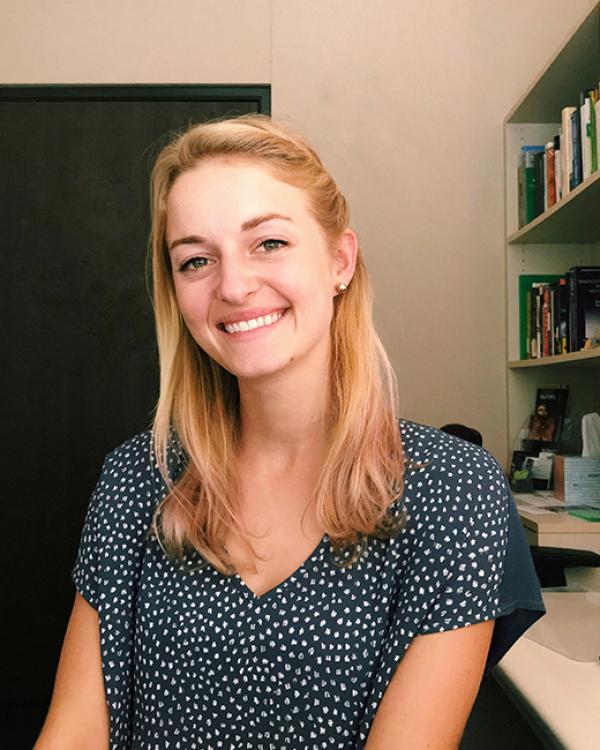
One of the Gevirtz School’s doctoral students, Meg Boyer, is the researcher behind a new Coping with COVID-19 study. Boyer is investigating what social and emotional experiences help individuals cope with the current Coronavirus outbreak.
As she is still recruiting participants for the study, the School thought now would be a good time to ask her some questions about her research. If you would like to take part, please take the eligibility screening survey now. Due to the rapidly changing nature of the situation, Boyer is only recruiting participants for this study until April 14th. If eligible, participants will complete three 20-minute online surveys four weeks apart about your thoughts, feelings, and opinions about yourself and about the COVID-19 pandemic.
Boyer is a doctoral candidate with an emphasis in Counseling Psychology in the Department of Counseling, Clinical and School Psychology, working with Dr. Steve Smith and Dr. Collie Conoley. She received her B.A. in Psychology with a minor in Economics from Haverford College in 2014, and then worked as manager of the Emotion and Self-Control lab at the University of Michigan. Her current research interests explore the integration of positive psychology in psychotherapy and interpersonal processes in emotion regulation. She has experience providing psychological assessment and individual and group therapy in local university and college counseling settings.
GGSE: What work were you doing when you pivoted to this research?
Boyer: My original dissertation study was quite different. I was looking at how cardiac vagal tone and perceived social connectedness influence therapeutic processes and outcomes. When the COVID-19 pandemic began, it quickly became clear that my in-person research project would need to end and that this was not going to be a “normal” period of life. I realized that any psychological processes I studied during this time were going to be affected by the pandemic, so I decided to study that impact directly.
GGSE: What most motivated you to take on a social-emotional study about COVID-19?
Boyer: The primary motivation is that COVID-19 is a widely experienced, potentially traumatic, and hopefully rare event. As an emotion researcher and psychotherapist in training, I could choose to see it as a disruption to my planned agenda or as an opportunity to learn something valuable about how individuals respond to a collective, extended crisis.
GGSE: Was it hard to get quick approval from the Institutional Review Board (IRB)--how did that process go? (Specifically UCSB IRB Approved: Protocol 58-19-0797.)
Boyer: The UCSB review board did an amazing job of accommodating the rapid pivot in my research. I developed my study and new IRB protocol as quickly as possible, then emailed our department representative to have a chance to speak with her directly and work out any issues before submitting it. Due to the time-sensitive nature of the study, they sent it through a rapid review process so that I could start recruiting participants as soon as possible. They are working extremely hard right now and I’m very grateful for how quickly they reviewed my study.
GGSE: How did you develop the procedure for the surveys?
Boyer: I have been doing online survey-based research projects for a few years now and created a study based on my knowledge of those procedures as well as literature on the impact of past pandemics, including the H1N1 and HIV/AIDS epidemics, and coping theory and processes. I specifically highlighted and included measures from positive coping frameworks, as I have a special interest in the application of positive psychology in psychotherapy. Given the rapidly shifting nature of the pandemic, I chose to use a longitudinal procedure that has participants complete each of the surveys on the same day (April 15th, May 13th, and June 10th) to be able to look back at the number and location of cases in the United States on those days.
GGSE: How big a sample do you hope to get?
Boyer: I’m aiming to recruit at least 250 participants for the study, but my primary goal is to get as nationally representative a sample as possible. Since I don’t have the funding to be able to pay for respondents on some of the big-data research sites, my recruitment is based on people sharing the call to others that they know. If anyone is interested in participating themselves or thinks they know someone who might be, I’d ask them to please check out the study site [link above].
GGSE: What do you hope a study such as this one will accomplish?
Boyer: There is a great deal of amazing and important research being conducted by psychologists all over the world on the impact of COVID-19. What I’m hoping to contribute with this study specifically is an exploration of coping with a longitudinal an applied positive psychological framework. As a counseling psychologist in training, I am always thinking about how the work that we do can be the most beneficial to people. I hope that I have created a project that will illuminate the specific coping strategies that people are finding helpful and unhelpful over the course of this extended crisis and which can quickly be integrated into direct interventions and public communications.